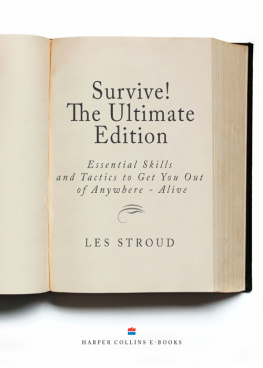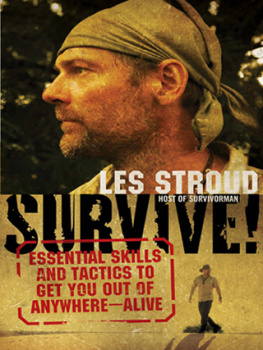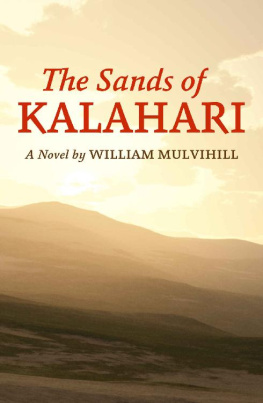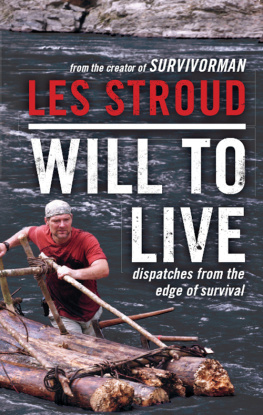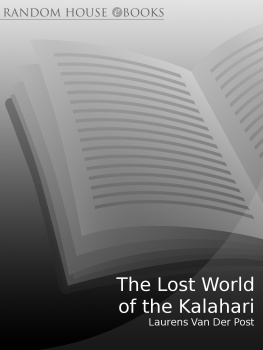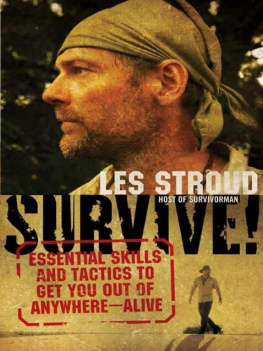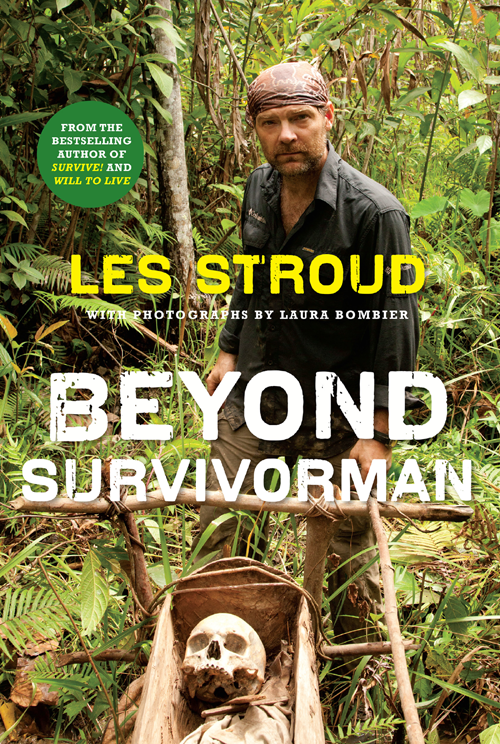LES STROUD
WITH PHOTOGRAPHS BY LAURA BOMBIER
BEYOND
SURVIVORMAN

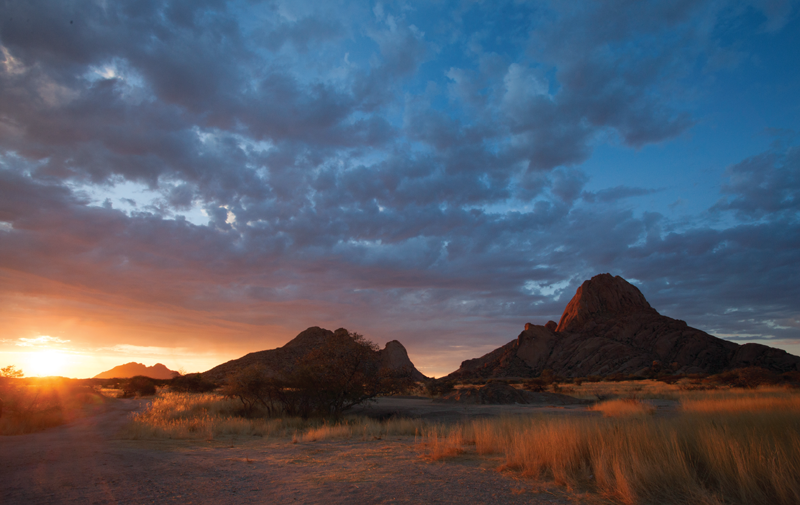
I dedicate this book and my writings to Mother Earth and to the spirit, energy, and power that runs through the planet, our souls, our hearts, and our minds and manifests itself as life. I dedicate this to you the reader, to assimilate in your spirit, in the hopes you will re-manifest your life towards your own happiness and re-invest your physical efforts to honor this planet, by taking yourself to the tipping point of living in a way that protects the earth, not destroys it.
LS
This book is dedicated to my mother, who moved away from the comforts of the city to raise me in the wilderness of Muskokawith the sun setting on my face and the water lapping at my feet. To my father, from whom I inherited my travel gene and my insatiable quest for adventure since our first journey together around the time I was 11. And to Les Stroud, who, after my fathers sudden death, blessed me with opportunitiestoo many to countto capture the amazing cultures, the powerful ceremonies, and the unforgettable experiences that you see in these photographs. The biggest adventure you can take is to live the life of your dreams. Unknown
LB
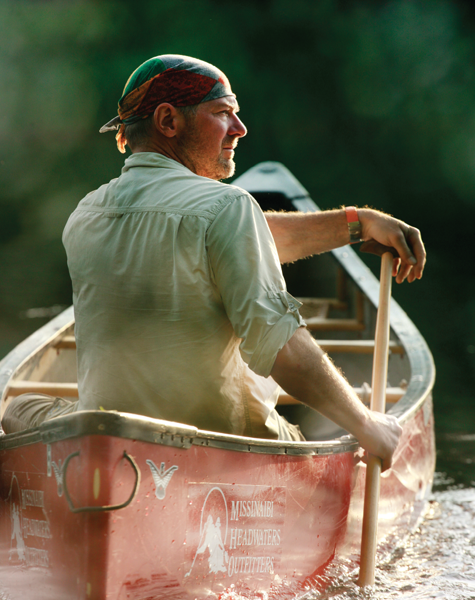
Over time and through experience, I have come to understand that keeping a culture alive requires three main components in what I call the cultural triangle: language, land skills, and spirituality. Of these, spirituality is always the most fragile and usually the first to disappear.
Although I often hear about the loss of language from a culture, I find this concern to be a bit of a red herring among anthropologists. Many times I have visited a remotely situated people to find their language alive and wellindicated simply by the fact that nobody speaks English! As for the second side of the triangle, it seems that relatively few lament when land skills are replaced by technology or more modern, civilized activities. Rifles replace spears, snowmobiles replace dogsleds, and, most significantly, jobs replace life on the land. So although the skills remain much the same, they become modernized. That leaves the spirituality component, often considered quaint according to our supposedly more advanced Western, Judeo-Christian or atheistic standards. Sadly, indigenous cultures appear in danger of losing earth connectedness and animism, two levels of spirituality I believe necessary for the continued health of the earth. And lest we forget, our own existence is intrinsically tied to the health of the earth. The fact is, we breathe out and a tree breathes in; the tree breathes out and we breathe in. Life doesnt get any more connected than that.
None of the stories I tell in this book flies in the face of a spiritual belief in God or scientific belief in atheism (or conflicts with the plethora of other spiritual and non-spiritual human concepts). Whether metaphysical, quantum energy, purely humanistic and physical, God and spirit, or all in the mind, our beliefs are what they are. If my artistry in whatever I am doingadventuring, filming, writing, or making musicis not born out of the honesty of what I experience in my life, then I have no business calling myself an artist. Life and the art and truth of living it are bigger than shelters and fire-starting. Life and connecting to the earth are more important than my stories and songs. Of course, none of us will know that for sure until we die or, rather, move on to our next form of lifewhatever that may be.
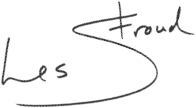
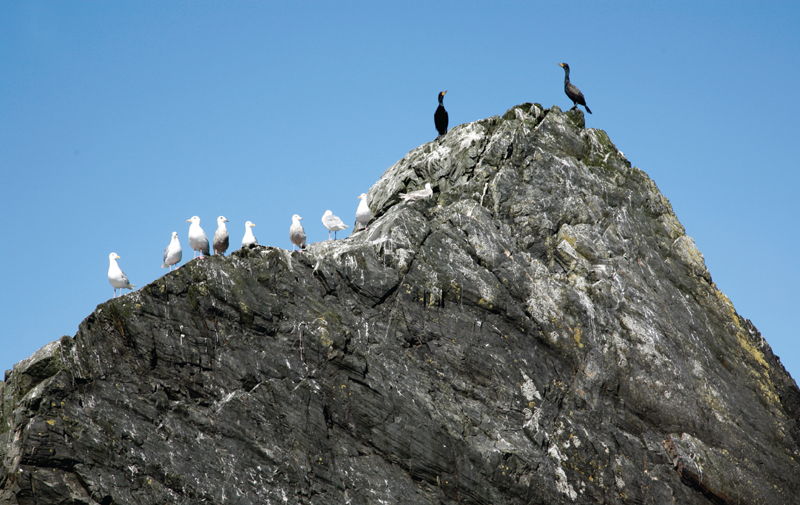
I was at the peak of my career as a documentary filmmaker. I had one of the highest-rated documentary shows on TV. I was getting out of a marriage that was no longer working. I was seeing substantial income for the first time in my life, and I was traveling the world. But two demons combined to make me feel completely lost. The first one was the oppressive thought that I would no longer be with my children a hundred percent of their lives. The second demon made the first one all the more unbearable: I no longer felt I had a deep spiritual connection to the earth. As I lay on the pebble beach on the ocean coast somewhere in Alaska, I couldnt find solace or comfort in the rocks, the trees, the water, the wind, or the cloudsthe very elements Id had a connection with for the previous 15 years of my life. The beauty and the magnificence of the natural world that surrounded me had always sustained me. But it sustained me no more.
I was Survivorman. My entire career was based on surviving in the wilderness and that should mean connecting with the wilderness. I wondered, If anyone could become one with the wilderness it should be me, shouldnt it? But I had lost it. My time in the wilderness had become a business. It had become a means to an end, when once it was the only end. The wilderness had become a location to create my work, when once it was the work itself. It had become a place of struggle and sometimes suffering, when once it was a place to find relief and rejuvenation. It was becoming my prison, when once it was my freedom.
I began to want that freedom back.
Les looks like Sting with a degree in edible plants. Thats how a journalist described me many years before Survivorman, when I was at the peak of my guiding days in Temagami, in northeastern Ontario. A few years before that time, I had walked away from a career in music and televisionand my attempts to become a rock star. I was in my late 20s, fit, tanned, and rich in wilderness skills and bush sense. Everything about me had to do with nature and adventure. During every canoe trip, somewhere along the way, I would lie back on a sun-warmed rock and fall asleep looking up at the clouds that danced across the blue sky. In those moments I was a kid again. Nothing else mattered. Not world issues. Not financial issues. Not family issues. Not even romance. (Okay, that always mattered.) Time in the wilderness was a glorious escape from all things domestic, mundane, and tedious. It was a long way from all things big and important to the rest of the world. I could exist completely unaffected by whatever was happening out there. I was here. Here in the beautiful nature that nurtured my soul. Here where some kind of positive energy force filled me constantly and never brought me down. It was 24/7 nirvana. And it gave me a permanent smile.
Hours would pass as I lay quietly by a lake or river, and then I would turn to one side and kiss that sun-warmed rock beneath me. It was my way of saying thank you. In a similar way, before I would cut down trees to make a survival shelter, I would say thank you to the energy that was about to give of itself to me. When, on any given adventure, I gazed at the glorious splendor that is the natural world, I would say thank you. Thank you to whom or what? I dont really know: God, maybe; Mother Earth, perhaps; the universe itself? I dont know. I knew just that offering gratitude was important because I was truly lucky and blessed to be given all these experiences.


